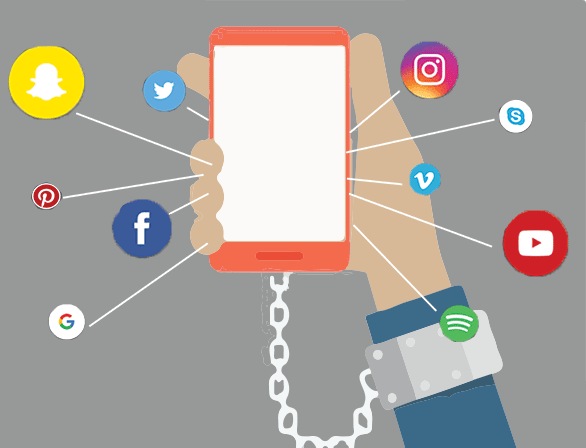Life on Screen
Sequoits enter the building each day looking to find an outlet to learn about both life and themselves; however, they find themselves confined to the glass screen in front of their faces.
More stories from Tom Tom Staff
It’s almost natural to us at this point: sending “streaks” each morning, posting our meals on our stories, taking pictures with our friends every time we go somewhere, snapchatting in class or laying in bed scrolling through Instagram.
Without an ounce of thought, we continuously repeat these actions in our everyday lives. As high school students, it’s become the norm to spend hours on our phones. New technology has brought our friends and peers as close as touching our screens two times.
Of course, it’s easy to look at the bright side of this outbreak. Some would say we are never bored and communication between people has become faster and easier. Others say we are able to capture every memory on camera and we are lucky that homework becomes easier with a smart-phone at our hands; however, it seems that we have been ignoring the immense consequences this habit brings.
We don’t want to say that creating new lifestyles as our society advances is bad; in fact, it’s completely normal. But what happens when these new additions intersect ever-standing concepts like respect, productivity and education?
Looking around a classroom, there’s always that kid who listens to music constantly; the girl texting her friend from across the room, both of them giggling at their screen; and the guy who never ever stops snapchatting his streaks. During pep rallies, there are more people distracted by the entertainment of their phones rather than looking up to see the entertainment in real-life. And how come almost every fight at our school ends up online? More times than not, students are more comfortable with recording violence than than taking action to stop it.
It’s implausible to try and propose a solution to such a grand-scale problem that has grown roots into our society by now. The best we can do is attempt to paint a picture in our minds of the things we are missing out on. According to Common Sense Media, teens spend an average of nine hours per day online, including all forms of online entertainment. Imagine if we spent even half of that time working towards our own goals and bettering ourselves; some of us would be able to accomplish the things we yearn for: having a healthier lifestyle, bettering a specific skill and getting more sleep.
At the same time, we realize it’s impossible to create a complete separation between technology and state. But, what if we used the time on our screens more productively? There’s a fine line between entertainment and betterment. Sure, we can watch Jake Paul’s drama and Tana Mongeau’s clickbait once in a while; however, we need to learn how to take a step back and invest time into beneficial online habits.
To better our lives, there are other options than just Youtube to use as a source of entertainment. If you’re not familiar with podcasts, it’s like eavesdropping on a really good conversation. Like music, podcasts allow people to be productive while multitasking; they also allow one to learn more about any topic of their interest.
Receiving notifications plays a role in how often we check our phones. It’s okay to mute your phone during school, after-school activities and any other priorities you have. Additionally, removing unnecessary accounts and email subscriptions from your friends list and contacts will not only lessen screen time, but also the amount of rings and buzzes you get in a day. Combined, these two strategies can feel refreshing and has the chance to shrink your online presence.
We could continue to tell you about meditation apps, Ted Talks and more. Nonetheless, there won’t ever be a change unless you want one for yourself. Instead of spending nights on your phone doing useless things or not paying attention in class playing Pokemon, there are endless ways to better your time. When it comes down to it, all we can do is try to better our generation.


